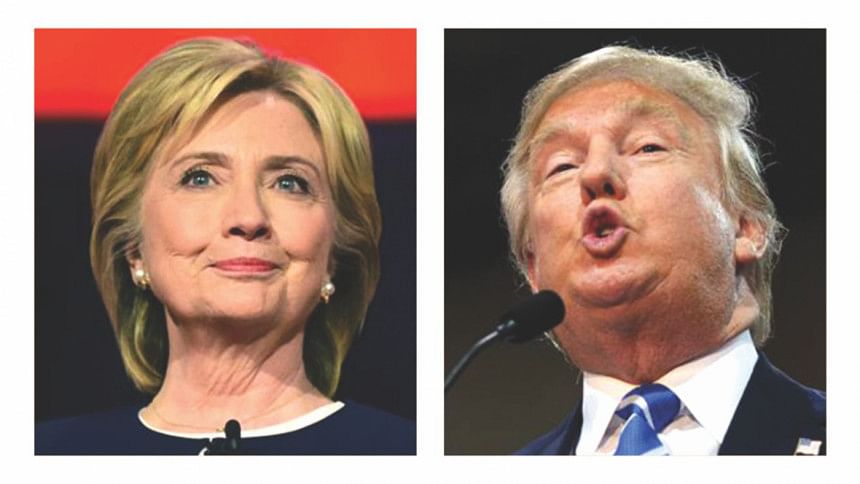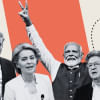The potential contenders

There's still some way to go, but it appears that real estate tycoon Donald J. Trump and former US Secretary of State Hillary Clinton are on their way to becoming their party's nominees in the upcoming US presidential elections in November.
Trump, an orange-haired, potty-mouthed, loose cannon of a presidential candidate, could well become the Republican Party's nominee after a commanding performance in Republican primaries on March 1.
Take that, you pooh-poohing political pundits! Republican establishment types, quit wringing your hands and deal with it.
The Trump juggernaut – or trainwreck, depending on your point of view – crashed through a slew of Republican primaries with overwhelming force. He handily won in seven states, often by substantial margins. Texas Senator Ted Cruz won in his own state as well as Oklahoma, and Florida Senator Mario Rubio won his first state in Minnesota.
Clinton, with an air of finality, rode on her extraordinary popularity among African-Americans to become the prohibitive frontrunner in the race for the Democratic nomination. Vermont Senator Bernie Sanders, the genial, avuncular grassroots populist, made a credible showing, winning in four states. But Clinton's massive seven-state victory pretty much means that the writing is on the wall.
The Clinton campaign's success was already augured by her previous overwhelming win in South Carolina, also thanks to the African-American community. Her victory in that state must have been sweet vindication, because almost eight years ago, she lost decisively to a young, precocious one-term senator from Illinois – Barack Obama. That loss, ironically enough, was also powered by African-Americans.
The ties of friendship between the Clintons and the African-American community go back decades. In South Carolina, African-Americans voted for Clinton over Sanders by a mind-boggling 8-2 margin, thereby underscoring the deep affection and regard for Clinton.
This has helped her in the March 1 primaries, which included many southern states with high numbers of minority voters. Sanders' achilles' heel – his inability to get his message to resonate beyond white voters – was abundantly clear.
That said, in this classic David vs. Goliath fight, where Clinton has the full backing of the party and a lopsided financial advantage, Sanders has managed to bring the battle to Clinton by an admirable grassroots fundraising effort, thanks to a resonant critique of a grossly unequal economic system.
The odds remain steep for Sanders, but his single-minded focus has forced the Democratic Party to take the issue of economic inequality seriously. The party has benefited from the primary contest, which has forced Clinton to hone her skills, and yet it has been remarkably free of rancour, thanks to the mostly civil and substantive political debate.
The Republican primaries, on the other hand, have become a three-ring circus, plagued by intra-party schisms that threaten to tear the party apart.
The centre of all the action is the narcissistic Trump. Addressing massive, boisterous rallies, showing up all the time on television, and merrily taking aim at his adversaries on Twitter, Trump is having the time of his life. Trump has called Senator Rubio a "lightweight" and "little," Senator Cruz "nasty" and a "liar," in attacks that have more in common with a kindergarten playground brawl than a political debate.
The latest Republican debate and subsequent war of words descended to the level of the gutter. Trump got into acrimonious arguments with Cruz and Rubio during the debate, and as is his habit, the feud quickly degenerated into name calling. Trump called Rubio a "choker" and Cruz a "liar."
The following day, Rubio retaliated by making coarse and lewd references to Trump, with the atmosphere more reminiscent of a professional wrestling contest than a race to choose the nominee for a presidential election.
Republican Party elders are aghast and conservative policymakers are appalled.
US Senate Majority Whip John Cornyn "raised serious concerns about Donald Trump's surging presidential bid," CNN reported. "We can't have a nominee be an albatross around the down-ballot races," the Republican from Texas said.
US Senator Ben Sasse of Nebraska has declared that he won't vote for Trump if he is the nominee. Former New Jersey Governor Christie Todd Whitman, a Republican, agrees.
Yet Trump has been savvy in garnering support for himself. Firebrand anti-immigrant Senator Jeff Sessions of Alabama has backed him, as has New Jersey Governor Chris Christie and Maine Governor Paul LePage.
The time of reckoning has arrived for Trump's adversaries, and the prospects look especially grim.
"The Republicans seem to be reeling, unable or unwilling to comprehend that a shady bombastic liar is hardening the image of their party as a symbol of intolerance and division," The New York Times said in a scathing editorial.
The results of the March 1 primary have done little to resolve the matter. Cruz's victories in two states and Rubio's win in one state mean both will likely remain in the race, as will Ohio Governor John Kasich. This will make it very difficult for any of them to take on Trump as they divide the anti-Trump vote.
If Trump does indeed become the Republican Party's nominee, will he get elected in November?
For many who are terrified at the prospect, baseball writer, historian, and statistician Bill James offers hope.
"I don't think that Trump can win, frankly, because I don't think there are enough morons to elect him," James wrote in a recent blog. "A certain percentage of the American public is just morons; that's the way it is. When you divide the public in two, then divide the voters in one of those halves among five candidates or more, a candidate can win by dominating the moron vote because it only takes about one-seventh of the total population to take the 'lead' under those circumstances."
But in a general election, James wrote that "when you're talking about needing 51 percent of the whole population, rather than needing 30 percent of half of the population, you run out of morons. I hope we will."
It is safe to say that this hope is widely shared.
The writer has been a reporter and an editor for the weekly California-based newspaper India-West for over 25 years.

 For all latest news, follow The Daily Star's Google News channel.
For all latest news, follow The Daily Star's Google News channel. 








Comments